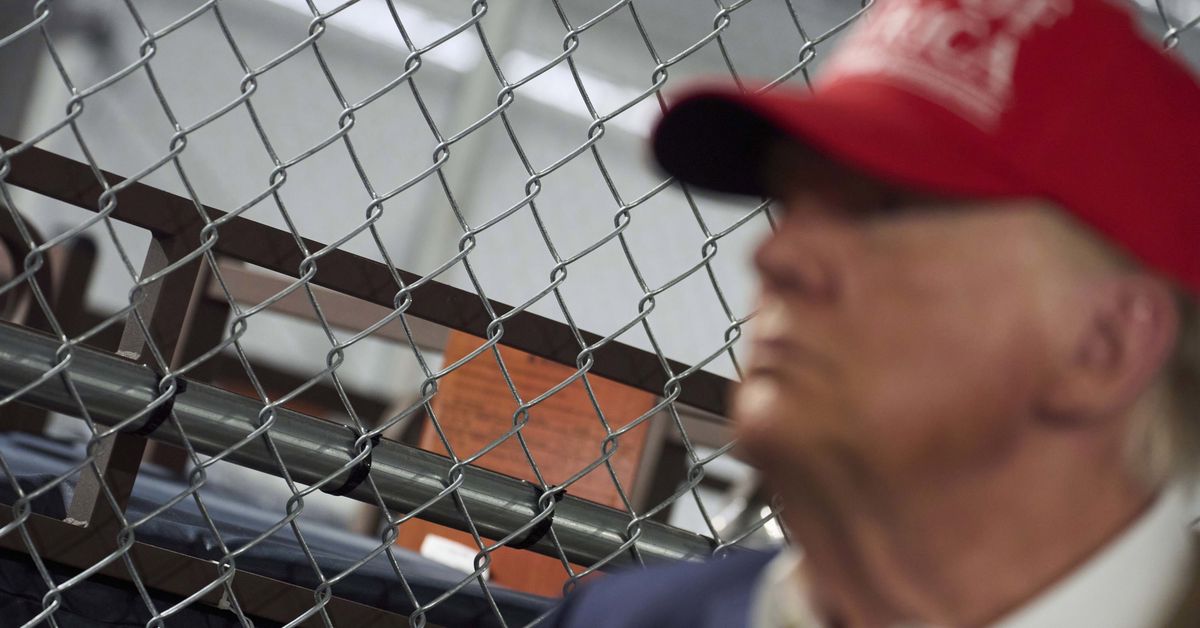Florida taxpayers could be on the hook for $US218 million ($333 million) the state spent to convert a remote training airport into an immigration detention centre dubbed “Alligator Alcatraz.”
The centre may soon be completely empty as a judge upheld her decision this week ordering operations to wind down indefinitely.
Shutting down the facility for the time being would cost the state $23 million to $30 million immediately, and it would cost another $23 million to $30 million to reinstall structures if Florida is allowed to reopen it, according to court filings by the state.
 President Donald Trump tours Alligator Alcatraz, a new migrant detention facility in Florida. (AP)
President Donald Trump tours Alligator Alcatraz, a new migrant detention facility in Florida. (AP)
The Florida Division of Emergency Management will lose most of the value of the $333 million it has invested in making the airport suitable for a detention centre, a state official said in court papers.
Florida signed at least $620 million in vendor contracts
Built in just a few days, the facility consists of chain-link cages surrounding large white tents filled with rows of bunk beds.
An Associated Press analysis of publicly available state spending data showed that Florida has signed at least $620 million in vendor contracts to build and operate the facility, which officials had initially estimated would cost $689 million a year to run.
A previous AP review found that as of late July, the state had already allocated at least $375 million to run the site, which opened July 1.
President Donald Trump toured the facility last month and suggested it could be a model for future lockups nationwide as his administration races to expand the infrastructure needed to increase deportations.
The centre has been plagued by reports of unsanitary conditions and detainees being cut off from the legal system.
 President Donald Trump, Gov. Ron DeSantis, and Homeland Security Secretary Kristi Noem, and others, tour Alligator Alcatraz. (AP)
President Donald Trump, Gov. Ron DeSantis, and Homeland Security Secretary Kristi Noem, and others, tour Alligator Alcatraz. (AP)
Centre faces several legal challenges
It’s also facing several legal challenges, including one that US District Judge Kathleen Williams ruled on this week. She denied requests to pause her order to wind down operations, after agreeing last week with environmental groups and the Miccosukee Tribe that the state and federal defendants didn’t follow federal law requiring an environmental review for the detention center in the middle of sensitive wetlands.
The Miami judge said the number of detainees was already dwindling and that the federal government’s “immigration enforcement goals will not be thwarted by a pause in operations.” That’s despite Department of Homeland Security lawyers saying the judge’s order would disrupt that enforcement.
When asked, the Department of Homeland Security wouldn’t say how many detainees remained and how many had been moved out since the judge’s temporary injunction last week.
“DHS is complying with this order and moving detainees to other facilities,” the department said Thursday in an emailed statement.
Environmental activist Jessica Namath, who has kept a nearly constant watch outside the facility’s gates, said yesterday that fellow observers saw metal framing for tents hauled out but no signs of the removal of FEMA trailers or portable bathrooms.
“It definitely seems like they have been winding down operations,” Namath said.
Based on publicly available contract data, The Associated Press estimated the state allocated $77 million for the bathrooms. Detainees and advocates have described toilets that don’t flush, flooding floors with fecal waste, although officials dispute such descriptions.
 Work on the new migrant detention facility dubbed Alligator Alcatraz. (AP)
Work on the new migrant detention facility dubbed Alligator Alcatraz. (AP)
Facility already being emptied
The facility was already being emptied of detainees as of last week, according to an email exchange shared with The Associated Press on Wednesday. The executive director of the Florida Division of Emergency Management, Kevin Guthrie, said on August 22 “we are probably going to be down to 0 individuals within a few days,” in a message to a rabbi about chaplaincy services.
Funding is central to the federal government’s arguments that Williams’ order should be overturned by an appellate court.
Homeland Security attorneys said in a court filing this week that federal environmental law doesn’t apply to a state like Florida, and the federal government isn’t responsible for the detention centre since it hasn’t spent a cent to build or operate the facility, even though Florida is seeking some federal grant money to fund a portion of the detention center.
“No final federal funding decisions have been made,” the attorneys said.
Almost two dozen Republican-led states also urged the appellate court to overturn the order. The 22 states argued in another court filing that the judge overstepped her authority and that the federal environmental laws only applied to the federal agencies, not the state of Florida.
 Gov. Ron DeSantis of Florida. (AP)
Gov. Ron DeSantis of Florida. (AP)
Republican Governor Ron DeSantis ’ administration is preparing to open a second immigration detention facility dubbed “Deportation Depot” at a state prison in north Florida.
Civil rights groups filed a second lawsuit last month against the state and federal governments over practices at the Everglades facility, claiming detainees were denied access to the legal system.
A third lawsuit by civil rights groups last Friday described “severe problems” at the facility which were “previously unheard-of in the immigration system.”

